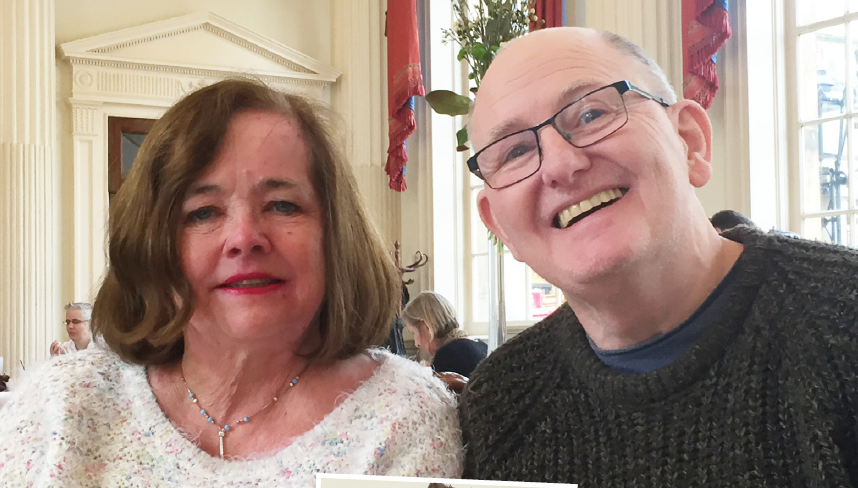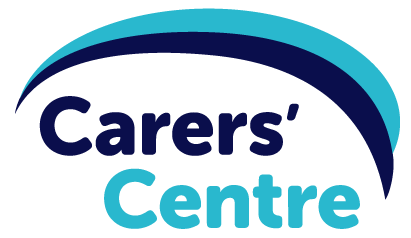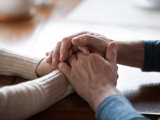Fiona's Story
“It’s helped speaking with other carers that know the devastation of a stroke. They get it. They know the difficulties.”
Everyone has their own unique journey in to their caring role. Caring can happen gradually, where you notice you’re taking on more tasks and responsibilities overtime, perhaps as a loved one ages. For others it happens suddenly and their life can change overnight. Fiona’s life changed when her husband, John unexpectedly suffered a stroke. She bravely shares her story.

“The night before John had his stroke, we were chatting after dinner and enjoying a glass of wine. This was something we did every night. That night the topic of conversation was retirement. In particular, where we should live. During our marriage we had moved house around the country and abroad over ten times, we weren’t sure where we wanted our forever home. Should it be abroad or should we stick to the UK? Well, any agreements we might have arrived at that night became irrelevant due to what happened the next day.
John was unable to move. He was unable to speak. His right arm was paralysed. He was unable to eat or drink. Most distressing of all, he was unable to talk. I had the upsetting business of informing our friends and family about what had happened. I did what I always do in dreadful situations - I put on my ‘big girl’s pants’ and dealt with it. John needed me more than ever before. I was not going to let him down.
It was difficult just getting out of bed, but I did, visiting John twice a day. As I walked down the hospital corridor, I remember saying to myself over and over again, ‘put on a big smile, put on a big smile’. I was determined to be brave.
A week later I had to go to hospital as a day patient. My sister asked if I wanted someone to go with me. I said with great determination that I was fine to go by myself. On the day of the appointment, I was getting ready and heard a knock on my door. I opened it to find my brother-in-law standing there.
‘I’m taking you to your appointment. I am not taking no for an answer. Is there anyone else you would like to come?’
"You need to look after yourself in order to help John"
Fiona's brother-in-law gave her some valuable advice about making sure she looked after herself first. If you know someone who is looking after someone else, you can help.
I felt such a sense of relief. After trying so hard to be brave, someone was looking after me.
I replied, ‘Yes, I need my Mum’
What I remember mostly about the drive to the hospital was that my legs could not stop shaking.
After I had the medical procedure I laid in a bed for four hours. It was fantastic. It was the first time since John’s stroke that I not been rushing around like a banshee! I spent the four hours processing what had happened to our lives. I gradually began to have a feeling of calm and acceptance.”
Fiona hopes that by sharing her thoughts and feelings in those first moments of her caring role, she can reach others in a similar situation that may be feeling overwhelmed and exhausted. “You are not alone. We’re a lovely community. It’s not selfish to look after yourself, it helps you to be the best carer you can be.”
Fiona shares some advice that may be useful to others that find themselves providing care to a loved one suddenly:
- Reach out to other carers, especially those that are caring because of a similar health problem. Fiona contacted The Stroke Association and her local Carer’s Centre. “It’s helped speaking with other carers that know the devastation of a stroke. They get it. They know the difficulties.”
- Stay in touch with friends and family. “Every Friday I have a virtual cocktail hour with my friends. We pour ourselves a G&T and have a laugh! I think video calling has been a life-saver. Some people can’t leave the one they care for, but can happily sit on a video call.”
- Exercise and fresh air is important. “I make sure I go out every day for a walk, it helps in all ways and gives you some headspace.”
- If you can, volunteer. Fiona had to leave her job to be a full-time carer to John. She often volunteers at her local Carer’s Centre when she can. “Volunteering has helped me a lot, it makes me feel useful, valuable and I’ve met some wonderful people.”
- Stay mentally active. “I regularly check the Open University for their free courses to keep my brain stimulated.”
As Fiona highlighted in her story, allow yourself time to think things through. If you’re overwhelmed, or having to make a tough decision remember we are here for you.
Need to talk?
We're here to listen. We understand the extra pressures and challenges you may be facing as you help your partner, family member or friend. Get in touch to speak to our supportive team. Call us on 0800 0388 885 or email us at support@banescarerscentre.org.uk (Mon - Fri, 9am - 1pm).
Activities

Craft Group
Join a welcoming, supportive group with other crafters! Bring along your latest craft project and enjoy a chat with others. No tuition given but there will be plenty of good company!

Bereavement Help Point
A relaxed and supportive community-based drop in where all people who are bereaved are welcome. Run in partnership with Dorothy House Hospice and We Hear You (WHY).

Young Carers Council
The YCC meets monthly to influence change for young carers locally and nationally — from school support to council decisions and even shaping our own service at The Carers’ Centre, this group makes big changes, for the better.

Simple Sculpture
Taking inspiration from artists and items from life you'll make simple sculptures using a variety of materials such as wire, clay, paper and found materials. Suitable for all levels.
Help us provide life-changing services to carers
































